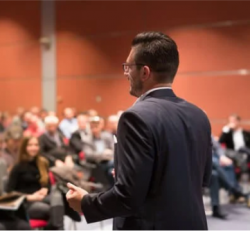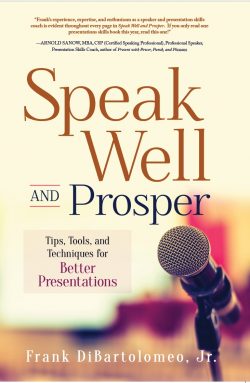Sunday, March 13, 2022

“Find out what’s keeping them up nights and offer hope. Your theme must be an answer to their fears.” – Gerald C Myers
I know lawyers get a “bum rap” in our society. However, there are several items speakers can learn from successful lawyers.
This article points out three essential items speakers can learn from successful lawyers: evidence, persuasiveness, and a call to action.
Evidence
I am certainly not a lawyer, but even I know that people are acquitted unless there is evidence of their crime beyond a reasonable doubt.
When you speak, you are certainly not trying to convict someone, but you are trying to convince your audience beyond a reasonable doubt that what you are saying can significantly enrich their lives.
You are probably a nice person who would not tell your audience something that was not true. But your audience is constantly evaluating whether they should “buy” what you are saying. In other words, they need to see “evidence” that what you are saying is true.
Evidence for you as a speaker comes in the form of relevant and related main points (three are recommended) and solid supporting points for those main points (again, three for each main point is recommended).
The supporting points are much more vital if you can cite an authority like Harvard, Microsoft, or the Congress of the United States.
However, although evidence of your main points is vital to your presentation, you have missed an essential part of your job as a speaker unless you make your points persuasively.
Persuasiveness
you speak, use persuasive language, body movement, and vocal variety (e.g., tone of your voice, the pitch of your voice, rate of speech) to convince your audience of what you say.
People make decisions through their emotions and justify these decisions through logic. These people are on the jury and in your audience.
I have been a Toastmaster for over thirty years. In that time, I have been to many speech contests. Invariably, the speeches that win all have one thing in common. They pull, some mightily, at the audience’s heartstrings.
The best trial attorneys and speakers know to appeal to the jury’s emotions and the audience.
The blind man who scales Mount Everest. The disabled person who wheelchairs across America. The homeless person who graduates from college.
All these stories resonate with your audience’s emotions.
So, you have evidence in your presentation, and you are persuasively delivering it. However, if you don’t have a call to action for your audience at the end of your presentation, you have minimal effect on your audience’s lives.
Call to Action
An attorney can have a very persuasive argument about why their client should be acquitted. Still, unless they lead the jury to a defined conclusion of their client’s innocence, there is a good chance their client will be convicted.
There is a striking similarity between this and you as a speaker and your audience. You can have a great opening, fully supported presentation body points and a heartfelt story in your closing. However, if you don’t convince the audience to make what you say in your presentation their own and act on this information, you will not affect your audience’s lives. Having your audience take positive action on what you are saying is why you speak to them.
the end of your presentation, a call to action gives your audience a goal for which they can strive, makes your presentation memorable, and gets you follow-on work with the group you are speaking to and other groups your audience knows that can benefit from listening to you.
What can you learn from lawyers? You can learn to have evidence in your presentations, deliver them persuasively, and give your audience a call to action at the end of your presentation.
When your mother asks you what you do for a living, tell her, “I do everything a successful lawyer does!
Your Call to Action
Provide authoritative evidence to your audience when you speak
Use persuasive language, body movement, and vocal variety when you speak
Always include a call to action for your audience at the end of your presentation, so they know how to apply the information you offer to enrich their lives
“The goal of effective communication should be for listeners to say ‘Me too!’ versus ‘So what?’”
– Jim Rohn
_____________________________ Frank DiBartolomeo is a retired U.S. Air Force Lieutenant Colonel and award-winning speaker, presentation and interview skills coach, and Professional Member of the National Speakers Association. He was awarded Toastmasters International’s highest individual award, Distinguished Toastmaster because of his outstanding work in public speaking and leadership.
Frank formed DiBartolomeo Consulting International (DCI), LLC (www.speakleadandsucceed.com) in 2007. The mission of DCI is to help technical professionals to inspire, motivate, and influence their colleagues and other technical professionals through improving their presentation skills, communication, and personal presence. Reach Frank at frank@speakleadandsucceed.com and (703) 509-4424.
Don’t miss Frank DiBartolomeo’s latest book!
“Speak Well and Prosper: Tips, Tools, and Techniques for Better Presentations”

Available now at Amazon.com and BarnesandNoble.com